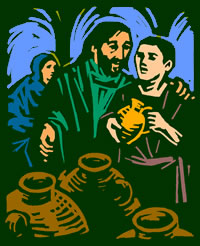
2nd Sunday in Ordinary Time Year C
In today’s liturgy - as we begin the cycle of the Sundays of the Year - the gospel reading from John tells the story of the ‘first sign’ worked by Jesus, in the presence of his disciples, in Cana in Galilee. With it we round off the celebration of the Lord’s Epiphany, or ‘manifestation’. The meditative tradition of the community that gave us this gospel has gathered together several ‘signs’ – miracles or works of Jesus – in which they have found a rich symbolism that nourishes their faith in the Eternal Son who came forth from the Father. As it concludes, this gospel is called a ‘book of signs’, put together so that the reader ‘may believe that Jesus is the Christ, the Son of God’, and believing this ‘have life through him’. In this ‘first’ sign, it is solemnly announced, Jesus ‘revealed his glory, and his disciples believed in him’. We are given notice that we should find here far more than the moving story of a wedding celebration that was saved from disaster by a miracle worked by Jesus.
There are few occasions in our human experience that bring the joy and celebration brought by a wedding. The presence of Jesus and his recently-called disciples has unmistakable overtones. In the gospel’s next chapter, John the Baptiser will describe himself as ‘the bridegroom’s friend’, who must disappear before Christ, ‘the bridegroom who has the bride’. We are reminded that the great prophets of Israel dared to call Yahweh, the God of the covenant, the devoted ‘Husband’ of the Chosen People; reminded also that Jesus referred to himself as ‘the Bridegroom’ (Mt 9:15). This theme is taken up in the first reading - like last week’s taken from the later writings of the Isaian tradition. Now the forthright message of hope is given to an exiled community struggling to re-establish themselves after their return from Babylon: ‘I will not grow weary until Zion’s integrity shines out like the dawn’. Past infidelity will not be remembered, as the Lord bestows new names of endearment: ‘As the bridegroom rejoices in his bride, so will your God rejoice in you’.
These great promises will be realized, the gospel tells us, with the coming of the Saviour’s ‘hour’. In the seven days described beforehand, Jesus has called his first disciples. Now they must look forward to something that far surpasses the grandeur of the first Creation – called to mind by the reference to seven days. The abundant wine reminds us of the ‘new wine’ spoken of by Jesus: the new order of things that he was inaugurating through his Paschal Mystery. In contrast, the water jars of ‘the Jews’ – representing those who refuse to believe in Christ – are empty. The quantity of wine produced (120 gallons – far more than required for the occasion!) underlines the abundant generosity of what is to be hoped for. When she makes her request on behalf of God’s simple people, Mary – the ‘woman’ who personifies the Church, the new Bride - is reminded that the generous realization of the hopes of Israel depends entirely upon the will of the Father. In response, she shows herself a model disciple, with words that are meant for all of us: ‘Do whatever he tells you.’
John Thornhill sm

